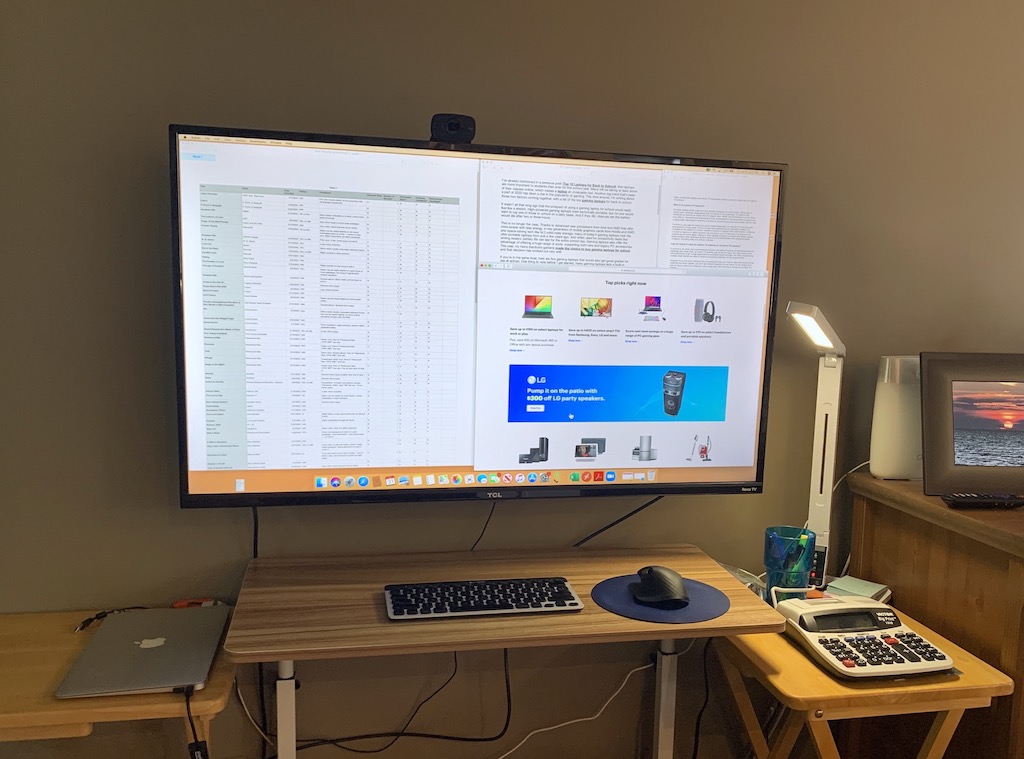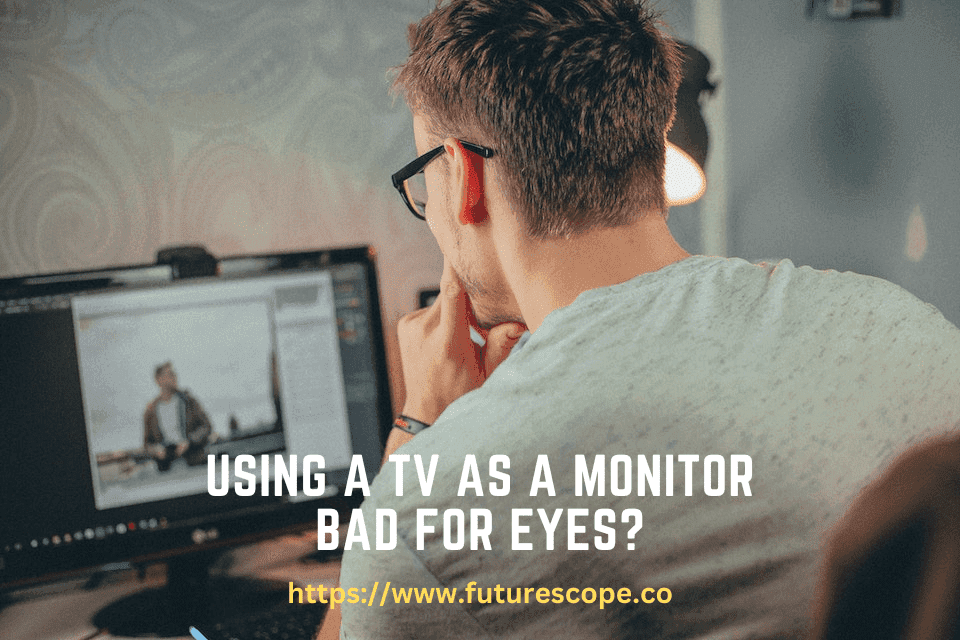What We Have Covered in This Article
Last Updated on February 18, 2023 by Editor Futurescope
No, using a TV as a monitor is not bad for eyes. In fact, TVs typically have lower refresh rates than monitors, which can actually be better for your eyes. However, you may want to consider the size of the TV screen when using it as a monitor, as smaller screens can cause eye strain.
However, some experts believe that using a TV as a monitor could potentially be bad for your eyesight. The reason for this is that TVs emit blue light, which has been linked to eye fatigue and even digital eye strain.
If you spend a lot of time staring at a TV screen, it’s possible that you could experience some negative effects on your vision. If you’re concerned about the potential impact of using a TV as a monitor, there are some things you can do to minimize the risk. First, try to take breaks often when watching TV so that your eyes can rest.
Additionally, make sure that the room you’re in is well-lit and that the screen isn’t too bright. You may also want to consider investing in an anti-glare screen protector for your TV. By taking these precautions, you can help reduce the chances of damaging your eyesight by using a TV as a monitor.
Is using a TV as a monitor bad for eyes?
Is It Bad for Eyes to Use TV As Computer Monitor?
It is not bad for eyes to use a TV as computer monitor. In fact, it can be quite beneficial. The human eye is very good at adapting to different light sources and levels of brightness.
This means that you can actually use a TV as your computer monitor without causing any strain or damage to your eyesight. The key is to make sure that the TV is set up in a way that is comfortable for you to view. This includes setting the right level of brightness and contrast and making sure that the screen size is appropriate for your viewing distance.
If you do all of these things, then using a TV as your computer monitor can actually be easier on your eyes than using a traditional computer monitor.
Why You Shouldn’t Use a TV As a Monitor?
It’s no secret that televisions are becoming increasingly commonplace as monitors for PCs and laptops. However, there are a few reasons why you might want to reconsider using a TV as your main monitor. Here are four reasons why you shouldn’t use a TV as a monitor:
1. Response Time
One of the most important things to consider when choosing a monitor is the response time. This is how long it takes for the pixels to change color when an image is displayed on the screen.
The lower the response time, the better, because it means that there will be less blurring and ghosting when images are in motion. Unfortunately, TVs typically have slower response times than dedicated monitors; so if you’re looking for a smooth gaming or video-watching experience, you’ll be disappointed with a TV.
2. Input Lag
Another important consideration for gamers and anyone who wants to watch videos or play audio/video files from their computer is input lag. This is the delay between when an input (like pressing a button on your controller) is made and when it’s registered on the screen. Again, TVs typically have higher input lag than monitors; so if responsiveness is important to you, stick with a monitor.


Disadvantages of Using TV As Computer Monitor
It is no secret that television screens are becoming larger and more high-definition. This has led many people to ask the question: can I use my TV as a computer monitor? Unfortunately, there are several disadvantages to using a TV as a computer monitor.
First, televisions typically have a lower resolution than computer monitors. This means that text and images will not be as sharp on a television screen. Additionally, televisions usually have a lower refresh rate than monitors. This can cause issues with screen flickering or “tearing” when playing video games or watching videos.
Second, most televisions do not have built-in speakers. This means that you will need to connect external speakers in order to hear sound from your computer. Additionally, the audio quality from built-in television speakers is often poor.
Finally, using a television as a computer monitor can be expensive. High-end TVs can cost hundreds or even thousands of dollars.
If you are only going to use your TV as a secondary display, it may not be worth the investment.
Using a TV As a Computer Monitor Pros And Con
A television can make a great computer monitor. The large screen size is the biggest advantage, and you might already have a TV that you can use. TVs also tend to have good image quality, although there are some important considerations to keep in mind.
One potential downside of using a TV as a monitor is input lag, which can be an issue for gamers or anyone who wants to use their computer for fast-paced activities. Here’s a closer look at the pros and cons of using a TV as your computer monitor.
Large Screen Size
The most obvious advantage of using a TV as a computer monitor is the large screen size. If you want to increase your workspace or just have more room to spread out, then a TV is definitely the way to go. You’ll be able to see more of your work at once, and things like video editing will be much easier with all that extra space.
Good Image Quality
Another advantage of using a TV as your computer monitor is the image quality. In general, TVs have better image quality than monitors because they use different display technology.
This means that text will be sharper and colors will generally look better on a TV than on a typical computer monitor. Of course, there are exceptions and some high-end monitors can match or exceed the image quality of even the best TVs.
Which type of monitor is better for eyes?
As technology continues to evolve, there’s an increasing amount of time spent staring at screens. So when it comes to choosing the right monitor, it’s important to consider your health and well-being. The quality of your monitor can have a huge impact on your eye strain and headaches that are often caused by staring at a bright or flickering screen. To help you pick the best monitor for your needs, here are some tips to make sure you find the perfect fit.
What are the different types of monitors?
The two main categories of monitors today are flat panel and curved panel monitors. They both share many similarities but differ in several aspects including screen size, viewing angle, and resolution. Here is a brief overview of each option: Flat Panel Monitors – These displays offer improved readability over traditional screens due to their wide field of view and uniform brightness distribution across all areas of the screen. With this being said they also tend to be more expensive than curved panels due to additional material costs required to produce them properly.
Which type of monitor is better for eyes?
As technology continues to evolve, there’s an increasing amount of time spent staring at screens. So when it comes to choosing the right monitor, it’s important to consider your health and well-being. The quality of your monitor can have a huge impact on your eye strain and headaches that are often caused by staring at a bright or flickering screen. To help you pick the best monitor for your needs, here are some tips to make sure you find the perfect fit.
What are the different types of monitors?
The two main categories of monitors today are flat panel and curved panel monitors. They both share many similarities but differ in several aspects including screen size, viewing angle, and resolution. Here is a brief overview of each option: Flat Panel Monitors – These displays offer improved readability over traditional screens due to their wide field of view and uniform brightness distribution across all areas of the screen. With this being said they also tend to be more expensive than curved panels due to additional material costs required to produce them properly.
Is a TV As Good As a Monitor?
No, a TV is not as good as a monitor for a variety of reasons. Monitors are designed to provide the best image quality and response time for computer use, while TVs are designed to provide a more cinematic experience. Monitors usually have higher resolutions and refresh rates than TVs, and they also have more advanced features such as adjustable brightness, contrast, and color settings. Additionally, monitors are designed with less input lag than TVs, which makes them better suited for gaming.
Conclusion
No definitive answer exists to whether using a TV as a monitor is bad for eyesight. However, some experts warn that the blue light emitted by screens can cause digital eye strain and disrupt sleep patterns. Additionally, the high refresh rates of TVs may cause headaches or dizziness in some people.
As technology continues to evolve, there’s an increasing amount of time spent staring at screens. So when it comes to choosing the right monitor, it’s important to consider your health and well-being. The quality of your monitor can have a huge impact on your eye strain and headaches that are often caused by staring at a bright or flickering screen.
It is generally recommended to take breaks often when using a screen for extended periods of time and to avoid looking at screens in dark environments.









